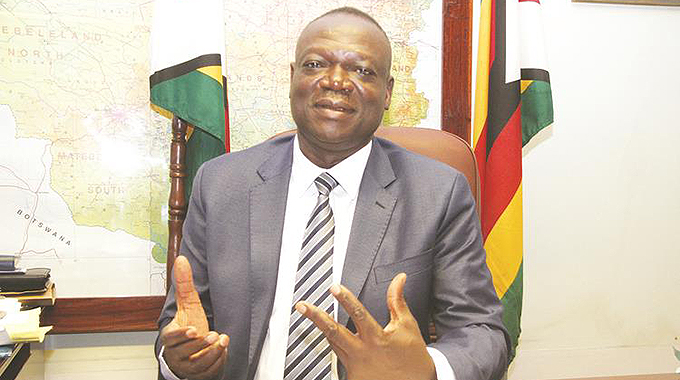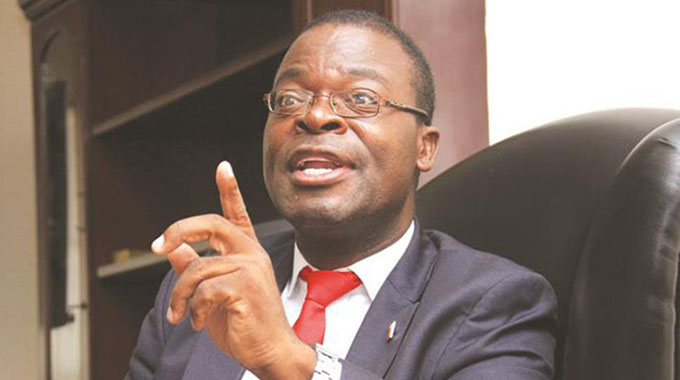‘Training vital to make devolution a success’

Thupeyo Muleya THE INTERVIEW
The new dispensation led by President Mnangagwa has started the process of devolving the national economy to provincial levels, a process set to increase socio-economic and infrastructural development evenly from grassroots to national level. Our Beitbridge Bureau Chief Thupeyo Muleya (TM) speaks to zanu-pf Politburo Member, who is an educationist and a former Ambassador to Egypt and also former Minister of State for Matabeleland South Provincial Affairs Dr Aaron Maboyi (AM) on devolution and other related issues.
TM: What is your take on the concept of devolution and how Government intends to roll out this process?
AM: Devolution from a purely synthetic English point of view, means removing certain powers from a central body to a lesser, an ancillary to the same body of governance. It means shedding some power from a congregation of power to certain units, to specific individuals, areas and or institutions. My view of devolution is very clear, this is a very complex country. It might look small from a geographical point of view, but we have different agricultural regions with different ecologies, rains and wealth patterns, among others.
Devolution as it stands from the definition given by the Government of Zimbabwe is a very unique phenomenon. You must note that firstly we are moving into a new dispensation which is different from a replica system of the colonial type of governance. We are into a real governance system that entails the people themselves, in their particular area, country and particular world.
When we now say we want devolution, it means that we within that new dispensation want each region, a particular area to look at itself and say what or who they are and what do they have and what can they do to exploit to their best advantage?
TM: You have indicated that regions, provinces are unique on their own. As a former Minister of State for Provincial Affairs in Matabeleland South Province, which economic or investment opportunities exist in this region (province)?
AM: Well, I am no longer the Minister of State, but during my stint as a minister, I had already drafted a map on how we can benefit from our own resources and a devolved economy as a province.
For your own information, Mat South is one of the richest provinces in the country in terms of natural resources and economic development opportunities. From a geographical point of view, all rivers flow from the Highveld down to our province, the Save, Limpopo, Sashe, Bubi, Mtshebezi Tuli, Mwenezi and Umzingwane among others. That in itself is very significant, if we capture (harvest) all that water which passes through Mat South, we could have a big lake and even turn this area into a greenbelt.
Secondly, the ecology of Mat South, how many Mopani trees do we have across the province? What are the advantages? This is a tree with dip roots which hold soils and help minimise corrosion of soil. Its fruits (cactuses) with an extreme value for cattle and the little insects on the leaves of the tree.
All the houses here before bricks were built from Mopani. This is a permanent rigid tree which cannot be easily denuded by nature. In addition, we have many useful trees which boost livestock production. We are a cattle country. We have the best grasses (sweet grass, brumby bushes and so on). In short we have livestock, minerals, water, four border posts, good soils for farming, transport and logistics, a good environment for citrus production et al.
TM: Are the communities aware of opportunities around them and do they understand the devolution concept?
AM: No, they don’t understand this concept. They need a lot of education to understand what we mean by devolution and how and when they can fit in. At the moment we are just doing what we call theory because the people don’t understand what we are talking about.
When you get to people and say you have these resources, they need to be taught even in schools. For instance, they need to know how to grow trees and replenish trees. They need what we call “participatory democracy”, they must be involved in the democracy of this country to be able to participate.
In simple terms, they must learn from what they have already e.g they have cattle, goats and others, minerals, the ecology and the environment. We need seminars, agriculture and various Government extension workers teaching or enlightening people on how to use the resources around them to turn around their lives socially and economically. Let’s have centres where people can learn on these developments.
TM: From your interactions with communities around the province (Mat South), what are their expectations from a devolved economy?
AM: The people have no idea. In general terms to them it’s just another Government programme and they believe that Government agencies will come and tell them what to do.
TM: The other school of thought is that devolution will usher in accelerated economic and infrastructural development in provinces. What is the situation in this province in terms of economic and infrastructural development?
AM: We are very far in terms of development, we are probably one the least developed provinces in terms of infrastructure in this country. At the moment we are majoring in infrastructure that is not adding value to our concept of understanding devolution. Look at Beitbridge town, it is growing fast in terms of housing development, but these do not bring wealth to the town or province.
We should be developing factories in which we do tanning of cattle or goat leather, glazing, considering that we have plenty of fine sand here.
Fine sand is a wonderful asset. That way we can promote export to other countries. We have a lot of minerals, including coal around Beitbridge which we must exploit. There are many factories or related industries we should develop to promote economic growth, we can have abattoirs, beef canning, breeding, manufacture stock feed and a lot of related services.
TM: From your experience as a diplomat, what lesson can Zimbabwe draw from other countries which have decentralised the management of economies from Central Government?
AM: The Government needs to create economic zones, because each area has a particular central item which makes it what it is. For example Mashonzha (amacimbi) are very common in this region, why don’t we develop a concept to economically empower the people? You can have serious Mashonzha canning factories and export finished products or you can have factories to add value to natural resources here.
TM: From a political point of view, in the not-so-distant future, provincial councils will be working in full swing. How would you like to see the PCs rolling out the devolution concept?
AM: At the moment, the people, in my humble view, that have been chosen to form those provincial councils are not adequate intellectually to be able to implement devolution. That’s my basic assumption.
You have young people or elderly men or women who are relatively schooled. However, we are not talking of academic education now, we are talking of experiential education related to the practice of these people. We need people to come down or be brought in and be with the people like what is happening at ARDA Matopo, that’s a success story. At the moment we have a lot of technocrats we are leaving out of this devolution programme.
TM: If Government is to implement devolution from an intellectual position, in your own view how best can they approach it?
AM: It is very difficult because our devolution is related to political parties. The general feeling from people is that it belongs to Zanu-PF only and it’s a political carrot being dangled around. As long as it’s related to politics or Zanu-PF, other people will assume it’s a Zanu-PF thing and they don’t see its significance as a useful concept. We need to move away from partisan politics if we are to write a success story.
TM: How best can the concept be demystified from partisan politics?
AM: The best thing for Government to do is to create a neutral commission related to the concept of devolution.
This commission should stand clearly unrelated to any major or minor political party in this country. It becomes a commission for the devolution of power in Zimbabwe.
All I want is that, Central Government should look at people with the skills and capacity to implement devolution, not because they want big positions, but these should become advisors in the Office of the President to turn the concept of devolution into a reality.
TM: At its inception, the new dispensation led by President Mnangagwa embarked on a massive re-engagement programme with the rest of the world. How can the re-engagement programme contribute to effective implementation of devolution?
AM: That engagement is a superb idea. Let’s re-engage those people who are experts in various areas, regardless of their inclination. They might be inclined elsewhere or be radicals, but they know, they have the knowledge. In Zimbabwe for example, we have people like the Goddards, the citrus farmers and so on whom we need to rope in, and they have the technical know-how. We have to embrace inclusivity. Let’s not keep out people because of race or whatever reason. The whiteness or blackness of a person has nothing to do with the wisdom and the productive ideas they bring forward. The President’s Idea of re-engagement is probably one of the best initiatives I have heard in this country. We don’t hate anybody in Zimbabwe, we should use the skills people have regardless of who they are. This country was brought up by exparts for example Malawians (mostly under the mining sector). Even if you look at people holding key positions in South Africa, they are Zimbabweans. I have trained some of these people at Bulawayo Polytechnic College. In fact, I have a son who is running a Civil Engineering Concern in the Cape Province. He and many others are doing a good job for South Africa. They have captured and given a good environment to exploit their knowledge and to build their economy and we can do the same.
TM: What should be done to localise the indigenization laws under a devolved economy?
AM: You will note that besides natural resources, we have five border posts (four with Botswana and one with South Africa). We have the best connection and borders with all the facilities. What we need is to open up our borders to boost economic growth and trade. After all the questions of borders must be relaxed. I am happy Sadc has been making strides in removing trade barriers.
Ends: Feedback [email protected]









Comments